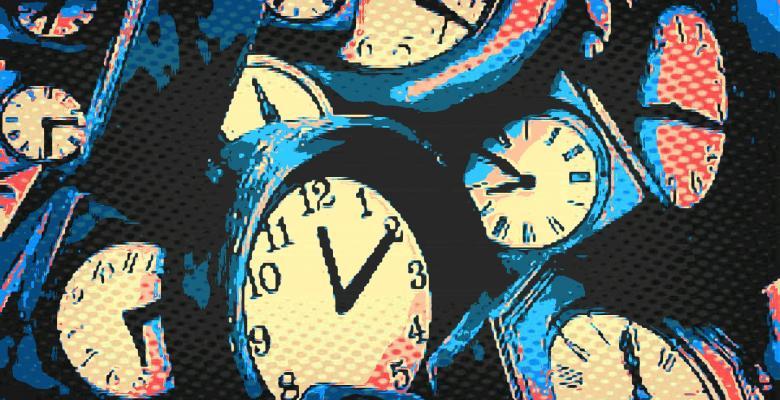Time is On the Side of the Little Ones
especiales

A new year begins, a strange human convention that divides everything, encloses everything; a piece of land that has imaginary limits, a step beyond is another country, which requires infinite papers for access, even when many times the inhabitants of one piece and the other belong to the same town and even, perhaps, to the same family. But those who share the wealth on one side are not those who share it on the other, or they were not in their origins and had to ensure exclusivity. The imaginary or real walls have not been broken for the human beings who produce the wealth, but they have been for those who enjoy it.
Time is infinite, but it’s divided into hours, days, weeks, years, centuries. Otherwise it would be invisible, we would only perceive it in the lines on our face, on our body; in the only two seasons of life, night and day. Now we see it passing by from the window of a train, ever faster, like lampposts on the track. As a teenager I tried hard to stop its passing, without understanding that it was not they who were moving. In a scholarship as I was, I measured time in weekends. Until I let it go: we do not live by watching the lampposts pass, but by making a life for ourselves on the train. However, the illusion of endings and beginnings drives us to rectify, to re-evaluate the paths we’ve taken, it offers us a necessary respite. Time divided into parcels also facilitates the archiving of memory, without which neither individuals nor societies could understand each other.
At midnight the spell is not broken, the miracle does not occur—the pumpkin turned into a carriage is the projection of a dream, and the end-of-year convention allows us to believe in it—but we cross that imaginary barrier with the hope that everything will be better from the next minute onwards. It has been a tough year for humanity, because life on the train is a disaster. Passengers in some carriages want to take over the space and wealth of others: there are wars of discredit, media and physical assaults, murders and robberies, corrupt preachers who fabricate lies and fake news, imaginaries filled with poison that turn friends into enemies and vice versa; there’s food excess and children starving, highly effective medicines, and populations decimated by curable diseases, amazing works of art and scientific achievements and millions of illiterate, alienated adults. The coming year does not come with magical solutions. These solutions are tough, and they depend on us.
For Cuba, which is suffering the blow of the blockade on its neck and the inclusion in a spurious list that causes the international closure of financing, it will be another tough year. There’s hope, however, open paths that come from collective effort, from what has been done and what’s yet to be done: I think of the high-tech food and hygiene product industries created, for example, in the Mariel Zone and the biotechnological ones, already in full maturity; of the growing and accelerated introduction of renewable sources of energy, such as solar photovoltaics, and of national oil and gas; of successful experiences, although still isolated and insufficient, of agricultural production; of the linking of state and private companies, especially those that produce goods; of the gradual increase in international tourism with the opening of new issuing markets, among many others.
We know that prosperity can never be reduced to material growth, that values are intangible but real and necessary, that possible equality and justice are essential and indispensable elements of the horizon the Cuban people have drawn up. “American laws have given the North a high degree of prosperity, and have also raised it to the highest degree of corruption,” warned José Martí. “They have metalized it to make it prosperous. Darn prosperity at such a cost!”
We also know that the ideological strength and unity of a nation in revolution comes above all from the facts, from the conduct (the moral) of the revolutionaries, from the real strengthening of socialist democracy in factories and popular councils, and from the leading role of its youth; that the continuity and consistency of the principles cannot be evaluated according to patterns of governability, because it is not just about sustaining a government, but the complex and indispensable maintenance of an alternative socio-economic system, the only one that can guarantee independence and justice in the country. Because of everything we know—the experience accumulated in 66 years of struggle—because of everything we have done and do day after day, we face the current difficulties with the certainty that they can be overcome, without expecting anything from imperialism. At midnight the spell was not broken. The blockade continues and is likely to increase. The metal barriers still persist, and we are not always accurate in describing them. But in many homes around the world, glasses were raised to Cuba, which is, as the Mexican López Obrador said, for its resistance, for its courage, for its conquests, a World Heritage Site. Time is on the side of those who fight, of those who do not give up. “Time,” Silvio sings, “is on the side of the little ones, / of the naked, of the forgotten. / Time is on the side of good dreams / and it is pronounced in hurried blows.”
Translated by Amilkal Labañino / CubaSí Translation Staff













Add new comment